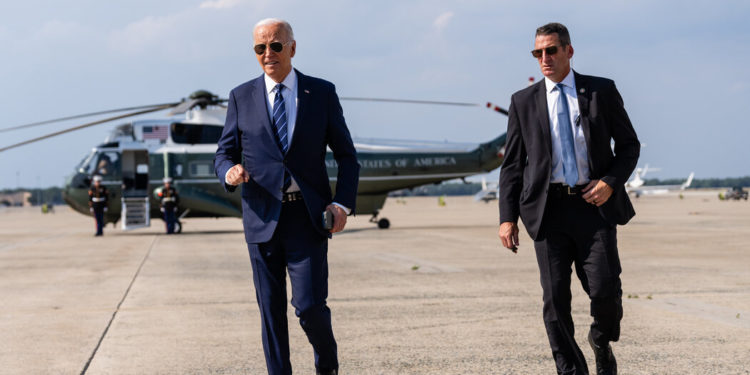The Democratic National Committee is pushing back by a week its plans to nominate President Biden for re-election in a virtual roll call as the party’s voters and many of its top officials continue to express discontent about heading into the general election with him atop their ticket.
Top party officials announced on Wednesday that the virtual roll call for Mr. Biden would take place during the first week of August, an accommodation to Democrats who had protested about plans that would have started the voting as soon as next week.
Mr. Biden’s weak debate showing, his uneven public appearances and his struggles in the polls have raised deep worries within his party. Nearly two-thirds of Democrats want him to quit the race, according to a survey released on Wednesday by The Associated Press and NORC. Congressional Democrats have also warned that Mr. Biden’s sagging political standing will make it far harder for them to win down-ballot races in November.
Senator Chuck Schumer of New York, the Democratic majority leader, was among those who pushed the party to hold off the start to its nominating process, according to a person familiar with Mr. Schumer’s involvement.
And on Wednesday, Representative Adam B. Schiff, Democrat of California, a candidate for Senate in the state and a top ally of former Speaker Nancy Pelosi, called on Mr. Biden to drop out of the race.
“Our nation is at a crossroads,” he told The Los Angeles Times. “A second Trump presidency will undermine the very foundation of our democracy, and I have serious concerns about whether the president can defeat Donald Trump in November.”
Representative Jared Huffman of California, who in recent days has organized fellow Democrats to pressure the D.N.C. to delay its process, called the party’s new timeline “a positive step” but said it was not likely to alleviate concerns about Mr. Biden’s viability.
“It’s a heck of a lot better than a jammed process that will tear us apart next week,” Mr. Huffman said. “This whole idea of jamming it through in mid-July crumbled under pressure, and that’s, I think, a good thing.”
Mr. Huffman said he had helped persuade dozens of congressional Democrats to sign a letter protesting a nominating process that could have started as soon as Monday. Given the timeline the party announced on Wednesday, Mr. Huffman said, he will not be sending the letter.
Anxiety over Mr. Biden’s weakness atop the ticket has brought new scrutiny to a D.N.C. nominating process that had been in place since May but had received little attention outside party insiders.
The D.N.C. faced a flood of criticism when it was revealed on Tuesday that the party could begin anointing Biden its standard-bearer as soon as Monday. Jaime Harrison, the party’s chairman, engaged in social media battles about the process as he sought to defend and explain the D.N.C. rules.
The D.N.C. for the first time on Wednesday informed its members that delegates set to nominate Mr. Biden would not begin to cast ballots in their virtual vote before Aug. 1. In a letter from the co-chairs of the party convention’s rules committee, Gov. Tim Walz of Minnesota and Leah Daughtry, a longtime Democratic Party official, party members and delegates on the rules committee were told that officials intended to conclude the process by Aug. 7.
In May, top party officials agreed to nominate Mr. Biden in a virtual vote ahead of the party’s national convention in Chicago, which is to begin on Aug. 19. Democrats then were concerned about an Aug. 7 deadline to place presidential candidates on the ballot in Ohio. Ohio lawmakers subsequently pushed the state’s deadline back to Sept. 1, though the law does not take effect until Sept. 1.
D.N.C. officials have expressed concern that a nomination after Aug. 7 could leave the party in legal jeopardy in Ohio. Washington, Montana, Oklahoma and California also have ballot access deadlines during the week of the party’s convention.
Mr. Huffman of California and others have argued that Ohio’s Aug. 7 deadline does not present a legal risk and could be ignored.
Mr. Walz, appearing on Wednesday at a news conference in Milwaukee on the sidelines of the Republican National Convention, said the convention’s timing required a virtual nomination before delegates gather in Chicago. The process for the nomination, he said, is not being rushed.
“We just need to get it done,” he said.
How precisely the process will work and when it will begin is expected to be determined during the rules committee’s meeting on Friday.
“No matter what may be reported, our goal is not to fast-track,” Mr. Walz and Ms. Daughtry wrote in their letter. “Our goals are to uphold our tradition of transparency, our commitment to an effective nominating process that delivers a nominee on all state ballots, and ultimately to set our nominees on a path to victory in November.”
Mr. Schiff’s defection on Wednesday means that more than 20 congressional Democrats have called for Mr. Biden to end his campaign and allow for a replacement nominee to be chosen. He has repeatedly said he will remain in the race.
There is no mechanism for the party to remove Mr. Biden as its nominee if he does not choose to drop out. The vast majority of the more than 4,600 delegates to the party convention are bound to vote for Mr. Biden on the first ballot, regardless of when that vote takes place.
The post D.N.C. Slows Biden’s Nomination as Party Discontent Persists appeared first on New York Times.



















